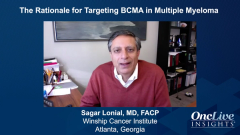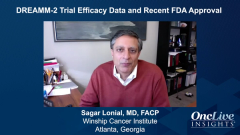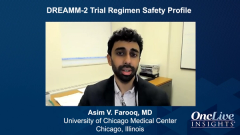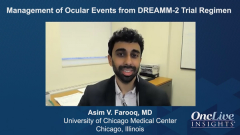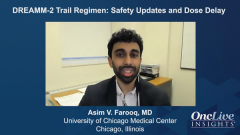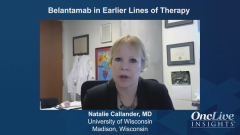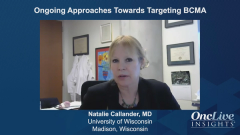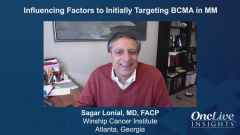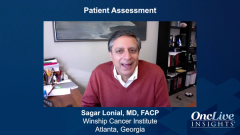
DREAMM-2 Trial Efficacy Data and Recent FDA Approval
Episodes in this series

Sagar Lonial, MD, FACP: One of the exciting areas of new development in myeloma was the recent approval of belantamab mafodotin. Belantamab mafodotin was approved in a randomized phase 2 trial called the DREAMM-2 study, and in the DREAMM-2 study, we at the Winship Cancer Institute randomized patients between 3.4 mg/kg of belantamab mafodotin, which was the MTD [maximum tolerated dose] from the phase 1 trial, and 2.5 mg/kg of belantamab mafodotin, which was a dose recommended by the FDA to see whether the adverse event profile was different.
In that trial, we looked at the primary end point, which was overall response rate, which was about 30% to 32%, and it was similar between the 2 different doses of belantamab mafodotin. We then looked at the progression-free survival [PFS], and it was about 3 months, which is not dissimilar from what we saw with pomalidomide/dexamethasone in the same patient population, for daratumumab in the same population, and for carfilzomib in the same population of patients with refractory myeloma. We then began to look at DOR [duration of response], and we noted that the DOR for patients who achieved MR [minimal response] or better, was somewhere around 11 months, which now puts it at one of the longest durations of response of any approved drug in the refractory myeloma setting. This is important because DOR, in my mind, speaks to a balance between efficacy, as measured by overall response rate, and safety.
For drugs that do not have a great safety profile but can induce a response, the DOR and the PFS are similar, but in drugs that can be managed, and responders can be kept on therapy, you see that the DOR is substantially longer than the median progression-free survival. We saw this for daratumumab, for which the DOR was somewhere between 9 and 10 months, and in belantamab mafodotin, we see this as well: the PFS was 3 months, but the DOR was closer to 11 months. We know that, in these responders, the median overall survival is likely in excess of 13 months, which is significantly longer than the 6 to 11 months that I mentioned earlier as the median expected survival for patients with triple-class refractory myeloma.
Now, we also did some subanalyses from the DREAMM-2 study evaluating patients with high-risk genetics vs everybody without high-risk genetics. We demonstrated that the PFS and overall response rate were similar between those 2 groups of patients. We also looked at patients who had a renal insufficiency or were older, and we saw similar results: they were balanced between the 2, and there was no detriment in PFS or overall response rate between those groups.
We then looked at patients who had earlier treatment, meaning relapsing on 5 or fewer lines of therapy vs 6 or more prior lines of therapy. The overall response rate and DOR appeared to hold up in that patient population as well. This suggests to me that belantamab mafodotin is an important new treatment approach for patients with triple-class refractory myeloma. It being dosed once every 3 weeks is a reasonable approach in partnership with an eye care professional to treat patients with refractory myeloma.
Transcript Edited for Clarity


